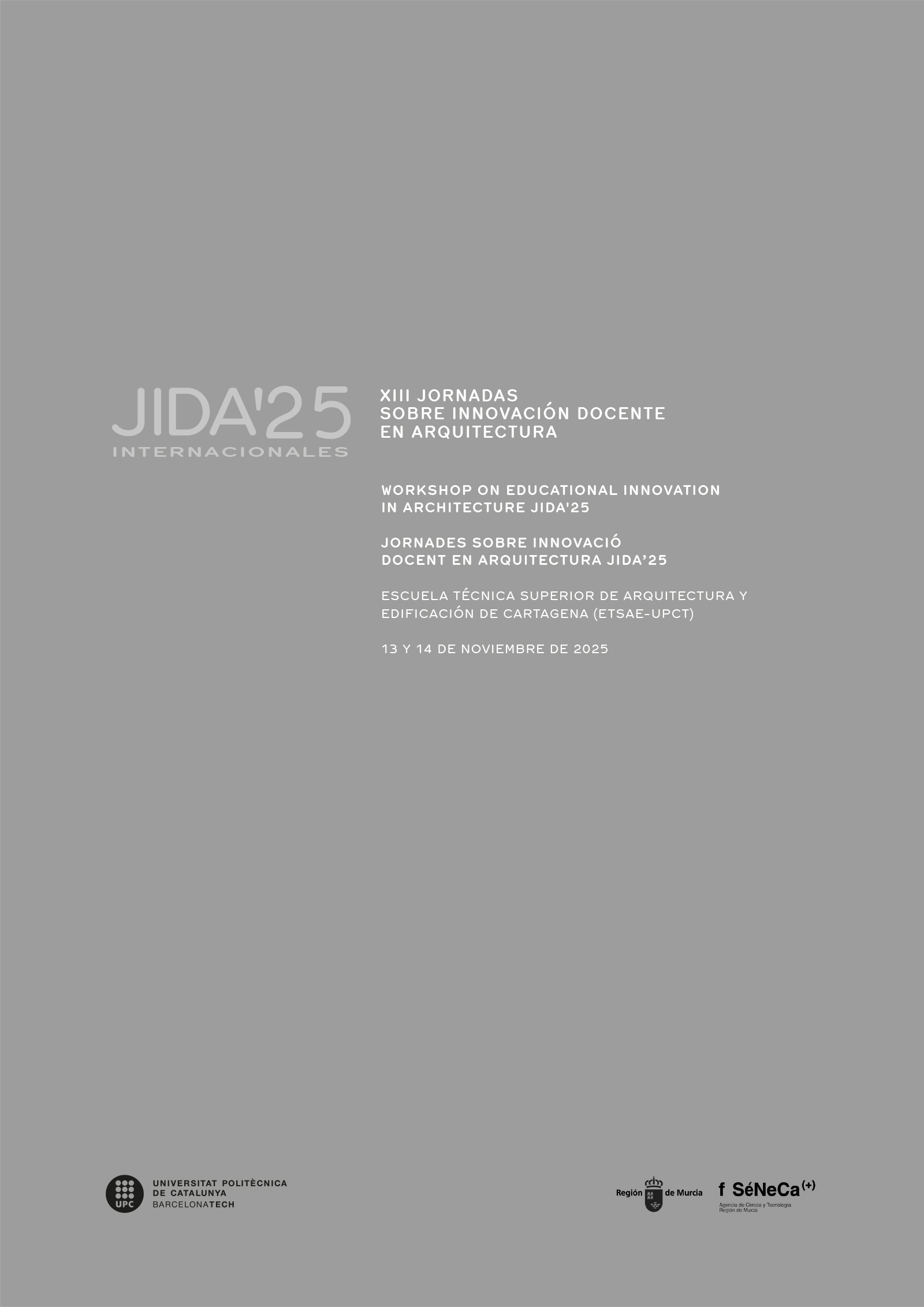AI in Architectural Education: Limits and Potential through Research by Design
DOI:
https://doi.org/10.5821/jida.2025.13699Keywords:
ethics, teaching, diversity, research, innovationAbstract
The paper investigates the possibilities for the responsible integration of disruptive technologies, especially artificial intelligence, into schools of architecture from a Research by Design (RbD) perspective. Building on action-based learning (Schön), design thinking, critical pedagogy (Freire) and technology ethics (Floridi), we argue that AI can function as a critical interlocutor and a catalyst for reflective thinking, rather than a substitute for human judgement. In the educational context we will analyze opportunities and risks in using tools such as ChatGPT, image generators, BIM, 3D printing and AR/VR environments across RbD stages: conceptual exploration, visual iteration, reflective dialogue and speculative design. We propose ethical ways of using these tools, with transparency criteria. We also discuss how AR/VR can support the understanding and exploration of space, as well as the near-real testing of errors.
References
Ansari, A. 2025. Liberland Metaverse. Zaha Hadid Architects. [online] Disponibil la: https://www.zaha-hadid.com [Acceso 15 septiembre 2025].
Butron Revilla, C.L., Manchego-Huaquipaco, E.G. y Prado-Arenas, D.L. 2024. Aplicación de la IA en los marcos teóricos: desafíos del Plan de Tesis de Arquitectura. Jornadas sobre Innovación Docente en Arquitectura (JIDA’24). https://doi.org/10.5821/jida.2024.13339.
Fabré Nadal, M. y Sogbe Mora, L. 2024. Introducción de inteligencia artificial en la evaluación de asignaturas de teoría e historia. Jornadas sobre Innovación Docente en Arquitectura (JIDA’24), Comunicaciones. https://doi.org/10.5821/jida.2024.13259.
Floridi, L. 2013. The Ethics of Information. Oxford: Oxford University Press.
Freire, P. 2000. Pedagogía del oprimido. Madrid: Siglo XXI.
Frayling, C. 1993. Research in Art and Design. Royal College of Art Research Papers, 1(1), pp. 1–5.
Friedman, Y. 1958–59. Spatial City Project (Perspective). New York: MoMA, Architecture & Design. [online] Disponibil la: https://www.moma.org [Acceso 15 septiembre 2025].
Ignea, T.-M. 2024. Render Twinmotion (fig.1–7). Unpublished student project, Faculty of Architecture and Urbanism, Cluj-Napoca.
Ioan, A. 2019. “Demasiado como tema, demasiado como dibujo, en detrimento de la profundidad de la investigación y de la coherencia de los procesos de morfogénesis”. Revista Arhitectura, 5(2), pp. 33–40.
Jisc. 2024. AI in tertiary education: guidance for responsible use. Bristol: Jisc. [online] Disponibil la: https://www.jisc.ac.uk/reports/ai-in-tertiary-education [Acceso 15 septiembre 2025].
Kerbl, B., Kopanas, G., Leimkühler, T. y Drettakis, G. 2023. “3D Gaussian Splatting for real-time radiance field rendering”. ACM Transactions on Graphics (TOG), 42(4), pp. 1–14.
Lobato-Valdespino, J.C. y Flores Romero, J.H. 2023. Más allá del estado estable: diseño discursivo como práctica reflexiva asistida por IA. Jornadas sobre Innovación Docente en Arquitectura (JIDA’23), pp. 102-114. https://doi.org/10.5821/jida.2023.12146.
Meta AI 2023. Segment Anything Model (SAM). Meta AI Research. [online] Disponibil la: https://segment-anything.com [Acceso 15 septiembre 2025].
NVIDIA 2022. Instant-NGP: Instant Neural Graphics Primitives with a Multiresolution Hash Encoding. NVIDIA Research. [online] Disponibil la: https://nvlabs.github.io/instant-ngp/ [Acceso 15 septiembre 2025].
PR Newswire 2022. Arquitectura digital y metaverso: nuevas tendencias. PR Newswire. [online] Disponibil la: https://www.prnewswire.com [Acceso 15 septiembre 2025].
PRWeek 2022. La innovación digital en arquitectura y metaverso. PRWeek. [online] Disponibil la: https://www.prweek.com [Acceso 15 septiembre 2025].
RIBA 2024. The Royal Institute of British Architects – Report on architecture and education. London: RIBA.
Rittel, H.W.J. y Webber, M.M. 1973. “Dilemmas in a general theory of planning”. Policy Sciences, 4(2), pp. 155–169.
Schön, D.A. 1983. The Reflective Practitioner: How Professionals Think in Action. New York: Basic Books.
UNESCO 2023. Guidelines on AI and education. Paris: UNESCO.
VICE Media Group 2022. VICEverse en Decentraland. VICE Media Group. [online] Disponibil la: https://www.vice.com [Acceso 15 septiembre 2025].
Zhang, X., et al. 2023. “NerfStudio: A modular framework for neural radiance field development”. In: Proceedings of the IEEE/CVF Conference on Computer Vision and Pattern Recognition (CVPR), Vancouver, 2023. Los Alamitos: IEEE, pp. 12312–12323.
Zimmerman, J., Forlizzi, J. y Evenson, S. 2007. “Research through design as a method for interaction design research in HCI”. In: Proceedings of the SIGCHI Conference on Human Factors in Computing Systems, San Jose, California, 28 April-3 May 2007. New York: ACM, pp. 493-502.






















